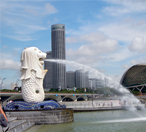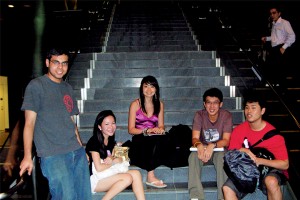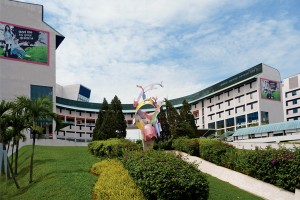 Multicultural, visually stunning and one of the world’s most developed economies, Singapore is now working towards building the future – by investing in education. Now acknowledged as a globalised economy and known for its political stability, Singapore has emerged as an education hub in South-East Asia and is now in the process of attracting some of the best talent. This includes inviting some of the finest universities to set up campuses or bringing in certain courses to Singapore. The result is over 70,000 international students from 70 countries!
Multicultural, visually stunning and one of the world’s most developed economies, Singapore is now working towards building the future – by investing in education. Now acknowledged as a globalised economy and known for its political stability, Singapore has emerged as an education hub in South-East Asia and is now in the process of attracting some of the best talent. This includes inviting some of the finest universities to set up campuses or bringing in certain courses to Singapore. The result is over 70,000 international students from 70 countries!
Contemporary yet traditional – an apt description for a city, where hi-tech wizardry rubs shoulders with Chinese, Malay and Indian traditions, running the gamut from Feng Shui to ancestor worship. From a tiny island nation of immigrants, Singapore has come a long way to become the hub of 21st century Asian cultural and technical progress. Consequently, an educational opportunity there should be quite an interesting option.
Already having gained recognition as a mega tourism and shopping destination, today, Singapore is working hard at emerging as a global schoolhouse. It now aims to become the education hub of Asia. Nowhere in the continent will you find a dynamic city that has attracted the world’s leading educational institutions, packed into an area of 670 square kilometres. Singapore, home to four million people of many ethnicities and nationalities, offers a diverse and distinctive mix of educational services in a safe, cosmopolitan and comfortable environment.
Education in Singapore draws from the latest knowledge across the globe, blending the East and the West. Students have an extensive choice between local and foreign schools and a wide array of courses. What’s more, some prestigious international educational institutions have established their presence in Singapore. The foreign universities include INSEAD, University of Chicago, SP Jain, IIM Bangalore, the Singapore – MIT alliance, Wharton- SMU alliance, Cornell-NTU alliance for hospitality management and Tisch School of Arts among a host of others.
“An added advantage is that there are over 7,000 MNCs, which look to absorb postgraduates,” says a senior member of the Education Services- Singapore Tourism Board. She adds that students in Singapore are allowed to work while studying to a maximum of 16 hours per week. “But they are more interested in gaining internships to build their resume,” she elaborates.
The Economic Development Board (EDB) of Singapore is the key body involved in facilitating the process of bringing foreign universities to Singapore. In fact, it has started ‘The Global Schoolhouse Initiative’ – inviting specialised foreign institutions to set up shop in Singapore. “It started with INSEAD, with a vision of ‘one school, two campuses’, so that neither is a lesser campus. Most foreign universities come with a traditional base – engineering, science, MBA – and go on to diversify to include areas like culinary arts, design/art, hospitality etc,” says a representative of the EDB.
There are many other initiatives like corporate training – moving further from full-time students to short-term training for those who are already employed. In fact, to broaden the purview of it being a known education hub, Singapore houses the regional headquarters for organisations like Informatics, Universitas21, Thompson Prometric and International Baccalaureate Organisation (IBO).
An ideal example of mixing business with pleasure, Singapore is indeed one of the top education destinations to watch out for!
 Financial assistance
Financial assistance
The most popular scheme for international students is the Tuition Fee Loan Scheme. For studies at a local university or polytechnic, the scheme administered by the Ministry of Education (MOE) loans up to 80 per cent of tuition fees and is available to all students. International students are eligible for the same grant, subject to the signing of a deed with the Singapore Government, undertaking to work in Singapore for a company registered in the country for three years upon completion of your programme. Scholarship details are offered by the government and local educational institutions, which are open to international students, log on to:www.singaporeedu.gov.sg/htm/stu/stu02.htm. Further, to help more international students make an informed decision on studying in Singapore, the Singapore Government has mandated the set up of Singapore Education, a promotional arm for education opportunities in Singapore.
Other things you need to know:
For universities and polytechnics, the academic year generally commences in Juy/ August and comprises two semesters. Check the respective university’s website to see if you meet the course requirements. Apply directly to the educational institutions as all of them accept online applications. Some institutions or courses may require you to undergo an interview or placement test, so be prepared for that too.
Entry requirements vary from institution to institution. As English is the common language of instruction, most institutions require students to meet a minimum standard of English, and TOEFL and IELTS scores are taken into consideration.
An international student is required to apply for a Student’s Pass and visa (if applicable) from the Immigration and Checkpoints Authority (ICA). For details visit: www.ica.gov.sg
Living expenses would amount to 750-2,000 Singapore dollars, including accommodation, food, transport, telecommunication, books and medical insurance.
Newer shores
As part of its education initiative, Singapore witnessed the establishment of its first privately funded, comprehensive university a few years ago – University of New South Wales (UNSW), Asia, which is whollyowned, independently-governed and run by UNSW. It has set up its first foreign campus, albeit, with the imprint of the parent organisation. “It is an ideal opportunity for networking, building friendships and increasing interaction for Asian students, without being too far away from home,” said Tharman Shanmugaratnam, the then Minister of Education, Singapore at the launch of the school.
 Popular institutes
Popular institutes
The National University of Singapore happens to be the oldest university in Singapore and is also the largest in terms of student enrollment and curriculum offered. INSEAD’s campus in Singapore is situated within Singapore’s knowledge hub and comprises eight amphitheatres, a large number of teaching rooms and discussion areas and an auditorium. The Singapore Management University has a huge campus that comprises six school buildings, he famous Li Ka Shing Library and the administration building. One of the notable things about this university is that it is surrounded by museums, art galleries, theatres, cafes, restaurants and educational institutes. The Ngee Ann Polytechnic is also a good choice for graduate courses as is the Nanyang Technological University.
Ever since 1965 when Singapore became an independent republic, education has always been a vital factor that influenced the growth and development of the state. The quality of life is high in Singapore and the city is fast becoming a global hub, offering an environment that is perfectly suited to international students. The infrastructure is top-notch making travel a breeze. Besides being the hub of education in Asia, Singapore, complete with its cosmopolitan feel and vibrant city life, makes it a fantastic place to study.
MAJOR INSTITUTES
- National University of Singapore
- Singapore Management University
- Nanyang Technological University
- INSEAD
- Temasek Polytechnic
- Singapore Polytechni
- Ngee Ann Polytechnic
- Nanyang Polytechnic
Volume 1 Issue 7




























